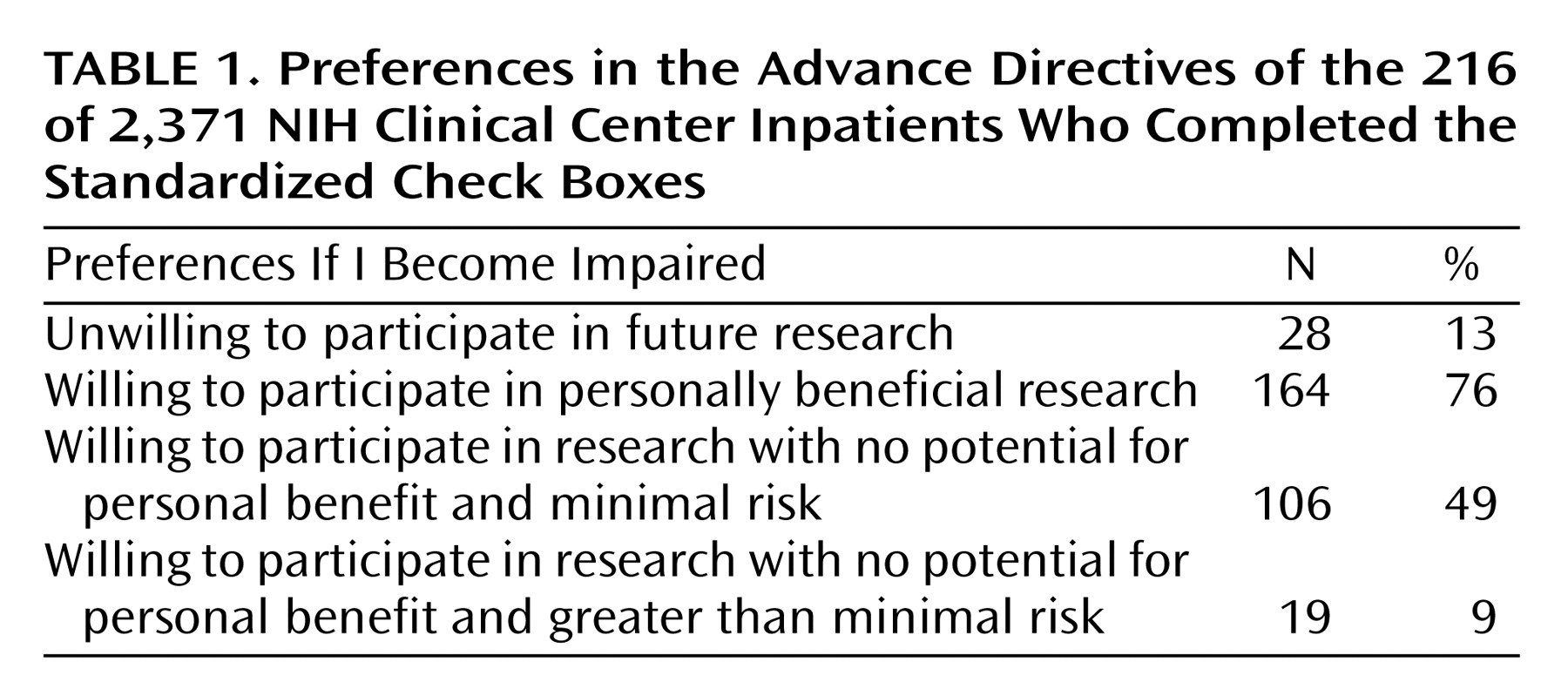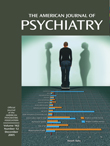Clinical research with cognitively impaired adults is important for improving the treatment of several conditions, including Alzheimer’s disease and schizophrenia. Some propose to allow cognitively impaired adults to be enrolled in research only when they complete a formal research advance directive while competent
(1–
4). To assess the impact of these recommendations on clinical research, we examined the rate at which adults completed a research advance directive in the clinical setting. We also assessed the preferences individuals indicated on their completed forms.
Method
We assessed all adults admitted as inpatients to the National Institutes of Health (NIH) Clinical Center, a 275-bed hospital, from March 14 to Sept. 13, 2000. All individuals admitted to the NIH Clinical Center are participating in or being considered for participation in clinical research. At each inpatient admission, adults receive a pamphlet titled “Advance Directives at the NIH.” This pamphlet describes the NIH advance directive, which allows individuals to appoint a proxy and to indicate their preferences regarding future research participation. All adult inpatients are then asked by an admitting nurse whether they have an advance directive and whether they would like to complete an NIH advance directive. Adult inpatients are encouraged to complete an NIH advance directive because it—unlike most state advance directives—explicitly addresses individuals’ preferences regarding future research participation.
Whether individuals have a prior state advance directive and whether they execute an NIH research advance directive are recorded in their chart and in the electronic medical information system. A copy of each individual’s NIH advance directive is stored in the NIH Clinical Center’s Department of Clinical Bioethics. We examined all three sources to determine how many adults completed an NIH advance directive during the study period. Completed NIH advance directives were examined for content.
Results
Overall, 2,371 adults were admitted to the NIH Clinical Center as inpatients during the study period: 82% were white, 10% were African American, 5% were Hispanic, and 3% were Asian/Pacific Islander; 45% were male, and 55% were female. Their mean age was 46 years (SD=15), and 75% were between 30 and 65 years of age. Some individuals were admitted multiple times during the study period, yielding a total of 3,151 inpatient admissions.
Just 11% of the subjects (261 of 2,371) completed an NIH research advance directive during the study period. In addition, 19% (N=450) had a state advance directive; 9% of these subjects (N=41) completed an NIH advance directive as well. Of the 261 inpatients who completed an NIH advance directive, 99% (N=258) appointed a substitute decision maker: 58% (N=150) appointed their spouse, 13% (N=34) appointed a parent, and 5% (N=13) appointed an adult child.
The section of the form that provides standardized check boxes was completed by 216 of the 261 individuals who completed an NIH advance directive: 13% (N=28) checked the box stating they were
not willing to participate in research should they lose the ability to consent, 49% (N=106) checked the box stating they were willing to participate in research that “will not help me but might help others and involves no more than minimal risk to me,” 9% (N=19) checked the box stating they were willing to participate in research that “will not help me but might help others and involves greater than minimal risk to me” (
Table 1).
Discussion
Adults who are unable to provide informed consent should be enrolled in clinical research only with sufficient evidence that such enrollment is consistent with their competent preferences
(5). Several proposed guidelines would require that individuals’ preferences be documented in a formal advance directive that they had completed while they were competent
(1–
4). The present study provides the first empirical assessment of the impact that this requirement might have on clinical research. Major findings are that few adults complete a research advance directive, even when given the opportunity to do so in a clinical research setting. Of those who completed a research advance directive, almost half were willing to participate in research that offers them no chance for personal benefit.
The low rate of completion is noteworthy, given that all individuals admitted to the NIH Clinical Center are participating in or being considered for participation in clinical research. In addition, all adult inpatients receive written information describing the importance of research advance directives and are asked whether they would like to complete an NIH research advance directive. These factors suggest that the completion rate in this study may represent the upper range at which adults in general will complete a formal research advance directive.
Although a low percentage of adults completed a formal research advance directive, the absolute number of individuals who were willing to participate in research should they lose the ability to consent was relatively high. Thus, proposals to require a formal research advance directive could exclude many impaired adults whose competent preferences supported research participation. To avoid this possibility, more flexible approaches should be considered to protect cognitively impaired adults while allowing appropriate research.
One possibility would be to develop advance directives that address both research and clinical care. Combined advance directives would allow individuals to document their clinical and research preferences and provide individuals an opportunity to discuss their research preferences with surrogates. In the absence of a formal advance directive, a first-degree relative might be allowed to make research decisions for an impaired adult
(6).
To increase the number of impaired research subjects who have an advance directive, investigators and institutional review boards might consider requiring research advance directives for subjects at high risk for losing the ability to consent, such as individuals with mild Alzheimer’s disease enrolling in longitudinal studies. At the same time, many individuals are likely to be seen after they have lost the ability to consent. To protect these individuals, an overall approach should encourage individuals to complete a research advance directive and also provide guidance for research with impaired adults who did not complete an advance directive while they were competent.
The fact that so few adults completed a formal advance directive implies that surrogates often will have to make research decisions based on
informal evidence of their charge’s preferences. The need to rely on informal evidence highlights the importance of clear guidelines, including laws, to clarify who can make research decisions in the absence of a formal advance directive and the standards these individuals should follow when making research decisions
(7).
Finally, the need for a mechanism to allow individuals to reject future research participation is highlighted by the finding that 13% of those who completed a research advance directive indicated that they are not willing to participate in research should they lose the ability to make their own decisions. Individuals also should be aware that formally documenting a preference to decline future research enrollment may preclude them from all research, including research with the potential to benefit them.
The present study has several limitations. First, we assessed completion rates at one institution only, and our results may not generalize to other institutions. Second, although NIH takes several steps to encourage individuals to complete a research advance directive, even more intensive approaches might yield higher completion rates. Third, some individuals may have declined to complete a research advance directive as a way of expressing their unwillingness to participate in future research. However, the NIH advance directive includes a check box that allows individuals to explicitly refuse future research enrollment. This box was selected by 13% of those who completed the form.


